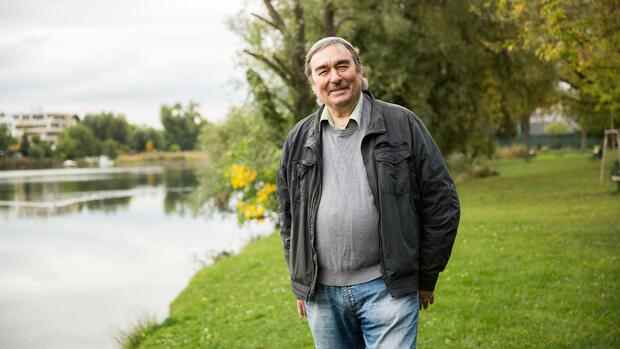Shares in a Russian potash producer made the investor rich.
(Photo: Renee Del Missier)
Vienna Piotr Kondrashov is said to be a billionaire oligarch, writes the business magazine “Forbes”. In other words, a new rich Russian who came into state ownership in the 1990s, in the hustle and bustle after the collapse of the Soviet Union.
However, the 72-year-old major shareholder of the Swiss solar company Meyer Burger does not exude glamor: in the old-fashioned Viennese offices, one encounters a man who seems to have been marked by life and work in the Soviet raw materials industry.
Kondrashov owns neither a yacht nor a football club, both of which are popular prestige objects of so-called oligarchs. “‘Forbes’ never got in touch with me,” says Kondrashov, who just throws his hands away when asked whether he is a billionaire or not.
The mining engineer has worked for the Russian potash mine and fertilizer manufacturer Silvinit for over 35 years, almost all of his professional life. He ended up as the company’s general manager, and became one of its owners when the voucher was privatized in the early 1990s.
Top jobs of the day
Find the best jobs now and
be notified by email.
Kondrashov came to a cash fortune at the end of 2010, when Silvinit was absorbed by the Russian competitor Uralkali and the second largest potash producer in the world emerged. The Russian owned almost 14 percent of Silvinit.
The strings in this merger, however, pulled the businessman Suleiman Kerimov in agreement with Vladimir Putin, who was prime minister at the time. Kondrashov would have preferred if Silvinit had remained independent. His relationship with Kerimov was strained. But he was already 60 years old at the time – too old to fight, as he says.
From the Soviet Union to Switzerland
Since then, Kondrashov has been an investor. His main residence is Vienna as a kind of exile; his largest single investment, however, is his stake in Meyer Burger, and the majority of his assets are pooled in the Elbogross holding, which is based in the Swiss canton of Zug.
With his money, Kondraschow saved Meyer Burger from ruin. The company once entered the solar business with diamond wire saws for cutting silicon wafers. From 2016 onwards, Meyer Burger got into increasing difficulties. Like the European solar industry as a whole, the company could not withstand the pressure of Chinese competition.
When Meyer Burger faced bankruptcy in 2016, Kondraschow’s investment company Sentis, a vehicle from Elbogross, acted as the largest financier of a capital increase. And last year Sentis again subscribed to shares worth 50 million francs. At that time, Meyer Burger raised 165 million francs to finance the realignment.
Meyer Burger no longer just wants to sell machines for solar module production. As a pure equipment manufacturer you have no chance, says the German CEO Gunter Erfurt. That is why the company now also manufactures the solar modules itself. Meyer Burger has built two factories in Saxony and Saxony-Anhalt for this purpose; The company recently announced that it would also open a production facility in the USA.
Company boss Erfurt knows from his own experience the violent fluctuations that the solar industry has experienced in recent years. He once worked as an engineer and manager for the German Solarworld, which went bankrupt in 2017.
Swiss solar modules with particularly high efficiency
In comparison with the competition, Meyer Burger’s solar modules are said to have a high degree of efficiency. The Swiss company owes this primarily to a German company: around ten years ago Meyer Burger took over the Saxon company Roth & Rau and made it the group’s competence center for solar cell technology.
The company’s new strategy is well received by investors. “Meyer Burger’s story is very promising,” says Constantin Hesse from the stock broker Jefferies. Meyer Burger now has a market capitalization of around one billion euros again. After a few sales, Kondrashov still holds 9.5 percent of the company.
The realignment of Meyer Burger was tense, however. Sentis pushed for a complete renewal of the supervisory board and proceeded in the style of an activist investor. However, Kondrashov no longer seems to feel like dealing with such conflicts himself. He has delegated this work to two financial experts from Austria who act as supervisory boards at Elbogross.
Kondrashov, who uses a classic cell phone instead of a smartphone and does not operate a computer, seems to indulge in nostalgia in the meantime. “I lived a happy life in the Soviet Union,” he says.
Existence was largely predetermined: the state provided education, housing and jobs. He also stipulated that university graduates had to hold out for at least three years in their first post after graduation – with Kondrashov it was Silvinit.
Kondrashov tells of this rigid system as if it had been a humble paradise.
Kondrashov: “I don’t wish anyone a life in Russia in the early 90s”
But didn’t he get wealthy at all thanks to the introduction of the market economy? “I don’t want anyone to live the way they had to lead in Russia in the early 1990s,” he says. High inflation rates made life difficult for people. As a manager, he sometimes hardly knew how to pay the salaries, says Kondrashov.
But maybe his melancholy has something to do with the customs that prevail in Putin’s Russia. The investor is just starting to feel how rough they are.
The Russian financial institution Ecoprombank went bankrupt seven years ago. Blogs claim that Kondrashov was one of the secret owners of the institute. They also accuse him of massive crimes. In Switzerland and Austria, he legally defends himself against the allegations and their spread. Russian authorities confirm that there are no criminal proceedings against Kondrashov.
More: The European solar industry is returning
